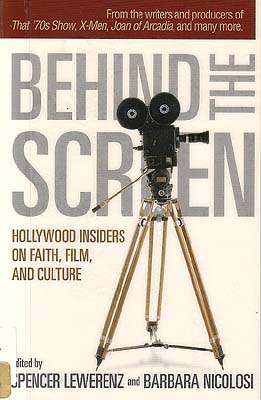
“I sat there in the sanctuary, thinking about Jesus as a storyteller. He knew the audience he was trying to reach, he defined his demographics, and tailored his stories accordingly. He took complex theological concepts and turned them into clear, entertaining stories that even a child could understand. And the way he handled special effects! He would do great in Hollywood today.” --Sheryl Anderson, “What Would Jesus Write?”
There’s a plan afoot in Hollywood to influence minds. No, the secular humanists aren’t behind it. This time devote Christians hope to use the media of movies and television to promote their viewpoints –- by working inside the great beast.
Details can be found in a series of essays collected in the book, Behind The Screen: Hollywood Insiders On Faith, Film, and Culture, edited by Spencer Lewerenz and Barbara Nicolosi. In the introduction the editors explain how Act One, a nonprofit program, was created to train “artist-apostles,” believers in Jesus who would try to transform, not take over, Hollywood.
Behind The Screen promotes the opinion that angry letters and boycotts don’t work against the studios. Hating and ignoring Hollywood only allows it to produce more unChristian trash. Instead, the staff and graduates of Act One hope to subtly influence the creative process, increasing the chances of more uplifting and positive entertainment to be produced.
But when I think of horror movies –- the intense, graphic horrors on the screen today –- I don’t associate them with uplifting themes. But Scott Derrickson in his essay says that as a Christian he feels compelled to deal with the dark side of existence. That’s why he was involved with such movies as Urban Legends: Final Cut and Hellraiser: Inferno.
The main point behind Act One is that most people go to mainstream movies; that’s where the numbers are. There are movies targeted at Christian audiences such as The Omega Code and Carmen: The Champion, but they appeal to Christians only and most of them aren’t that well made. Also, nonbelievers are put off by strong messages in overtly Christian films. People don’t want to be lectured.
Instead a positive Christian theme can be placed in a variety of mainstream entertainments, even in a television show like Charmed, a program following the supernatural adventures of three sexily-dressed sisters who are modern day witches. A Christian writer for Charmed explains in her essay how she projected positive values in a script, the importance of familial love and good winning over evil. (Me, I only noticed the boobs on Charmed. The witches don’t appear to be that bright.)
In his essay Scott Derrickson advises the Christian artist to belong to the Quality Club. A Christian doesn’t have to agree with everything promulgated by Hollywood, but he must succeed in the business or lose the opportunity to share his faith in the mission field of Tinseltown. A key rule of the Quality Club is moral integrity, servicing your employer to the best of your ability.
Derrickson sums up by stating: “It is morally questionable to seek the subversion of your employer’s business with covert Christian motives, and it is morally objectionable to fail to deliver what you are paid to deliver.”
What Act One seems to offer is a way to render unto Caesar the things which are Caesar’s –- while also letting Caesar render unto apostle-artists a great paycheck and maybe –- maybe –- the chance to bring someone to Jesus.
It’s like a Christian being paid to play the piano in a brothel. He hates all the sin around him, but if he slips in an inspirational song now and then, someone might pause from screwing or being screwed and find their way to God.
Until the cops raid the joint and shut it down.


Comments